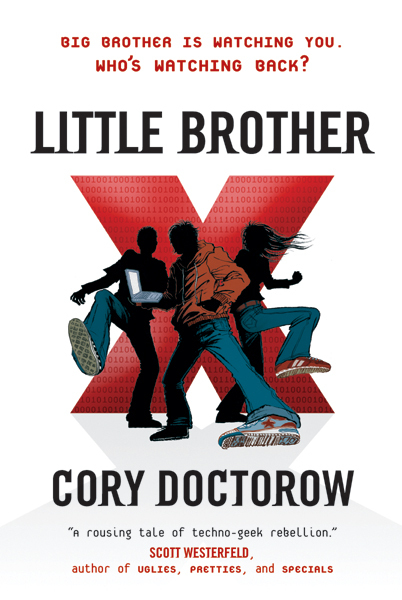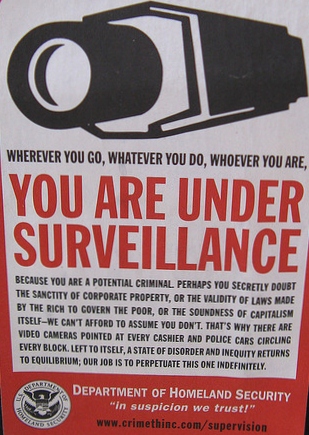 Cory Efram Doctorow is a Canadian-British activist in favor of liberalizing copyright laws and a proponent of the Creative Commons organization, using some of their licenses for his books. Doctorow is blogger, journalist, and science fiction author of the novel Little Brother
Cory Efram Doctorow is a Canadian-British activist in favor of liberalizing copyright laws and a proponent of the Creative Commons organization, using some of their licenses for his books. Doctorow is blogger, journalist, and science fiction author of the novel Little Brother
The story revolves around a rebellious San Francisco High School student named Marcus Yallow, who is also well known by his internet username w1n5t0n (pronounced Winston). One afternoon when playing an Alternate Reality Game (ARG) called Harajuku Fun Madness with his friends Darryl and a couple other friends. They witness a massive terrorist attack on the Bay Bridge. While trying to get help for Darryl, who was stabbed in the ensuing chaos, Marcus and his friends were all taken into custody to a secret location and falsely identified as terrorists by the Department of Homeland Security (DHS). After several days of questioning and miserable conditions he along with with other friends, besides Darryl, are released. non of them are aware what has happened to Darryl. When they return to San Francisco they discover that the city has come to a halt and that the DHS has turned the city into a police state with checkpoints, surveillance, and internet monitoring. Marcus decides to use his advanced technological knowledge to fight back against the DHS and find out what happened to his friend Darryl. Under the name M1k3y he started Xnet that united the rebelling teenagers, allowing them to organize anonymously. They started jamming DHS’s tracking system by switching peoples’ identity on transportation passes
I thought I’d mention that it was rather nice that throughout the novel Doctorow begins each chapter with a little paragraph where he describes to whom the chapter is dedicated. Each paragraph is dedicated to a different bookstore that he loves and has helped him in his career.
All the events that occured up to chapter 10, I thought were pretty crazy. Marcus gets his  debit card refused, because the government used cards to spy on people. He goes back to school and sees a camera in his classroom. The Government put a camera there to keep the children safe. It kind of makes me wonder whether theirs really freedom in a place where we can always constantly be watched. There are magnetic barcode labels and cameras everywhere. We live in a 24hr surveillance society especially in our digital age where majority of the people carry electronic devices like: ipads, ipods, cell phones, laptops etc.
debit card refused, because the government used cards to spy on people. He goes back to school and sees a camera in his classroom. The Government put a camera there to keep the children safe. It kind of makes me wonder whether theirs really freedom in a place where we can always constantly be watched. There are magnetic barcode labels and cameras everywhere. We live in a 24hr surveillance society especially in our digital age where majority of the people carry electronic devices like: ipads, ipods, cell phones, laptops etc.
In chapter 5 Marcus was creating an alternate operating system called ParanoidXbox, a system that assumes that its operator is under assault from the government and it does everything it can to keep your communications and documents a secret. As he’s creating the operating system he talks about how technology made him feel. It made him
feel: in control. My technology was working for me, serving me, protecting me. It wasn’t spying on me. This is why I loved technology: if you used it right, it could give you power and privacy.
I think this doesn’t leave any power and privacy for us, non-internet savvy people. it’s is almost as if the power and privacy is for an elite group, seeing as since not everyone on the planet, I’m sure, can create an alternate operating system or even anything along those lines.

You make a great point at the end, but I think Doctorow recognizes that not all of us are Internet-savvy, and his book is trying to inspire us to become more Internet-savvy. You don’t have to be rich to insure your privacy; all you need is to acquire the knowledge and make the effort.